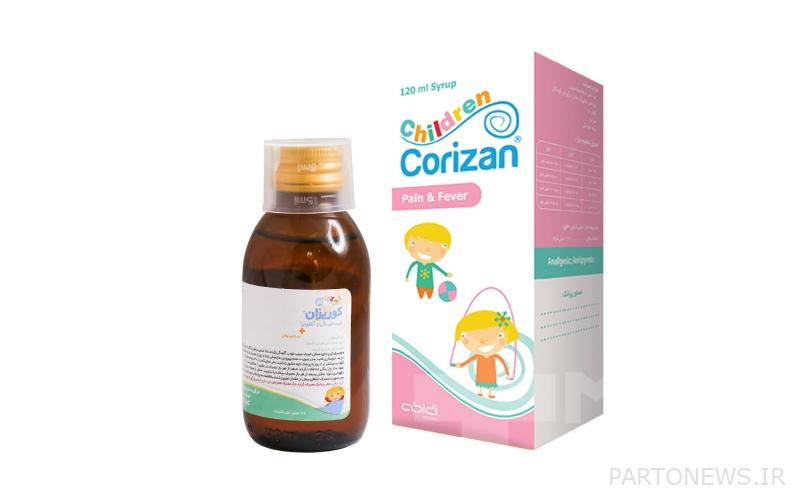What is Corizan? Uses and side effects of Corizan drug

Colds are one of the most common health disorders that affect millions of people worldwide every year. This disorder is mainly caused by viral infections, especially influenza viruses and rhinoviruses. In this context, anti-inflammatory and antiseptic drugs, especially Corizan drug, play an important role in reducing the symptoms and duration of a cold. In this article, we try to investigate the causes and symptoms of colds and then analyze this medicine as a treatment option to reduce the complications and the speed of recovery of patients with colds. Corizan is a non-steroidal anti-inflammatory drug (NSAID) that has anti-inflammatory, anti-allergic and antipyretic effects.
What we read in this article
Pharmaceutical forms of Corizan
- Corizan syrup
- Corizan tablets
Uses of Corizan cold tablets
A cold is a contagious upper respiratory infection that affects your nose, throat, sinuses, and trachea. You may have heard that a cold is a corona virus. In fact, more than 200 different types of viruses can cause the common cold. The most common virus is rhinovirus. Humans will suffer from colds more than any other disease during their lifetime. Adults get two to three colds a year, while young children get four or more colds a year. Some of the uses of Corizan include pain and fever caused by colds and sinusitis, relief of nasal congestion, sensitivity and runny nose.
- The biggest changes that will happen in WhatsApp this yearFebruary 3, 2024
- Applications for locating family and friends on AndroidFebruary 2, 2024

Pharmacological effects and mechanism of action of Corizan drug
The mechanism of action of Corizan drug is cyclooxygenase inhibitor, decongestant, antihistamine, which will greatly help in reducing cold symptoms.
Dosage of Corizan
Corizan cold medicine is a combination medicine used to treat cold and flu symptoms in adults over 12 years of age. This medicine contains acetaminophen (an analgesic and antipyretic), chlorpheniramine (antihistamine to treat runny nose, sneezing and itchy throat), caffeine (a stimulant that improves alertness and reduces fatigue), vitamin C (an antioxidant to strengthen the system body immunity) and… is formed. The general dosage is indicated on the medicine package. Consult your doctor for the best dosage.
- Corizan is used in adults 2 capsules per day, the number of times of use depends on the opinion and examination of the doctor.
- Taking more than 6 tablets or capsules of this medicine per day is not recommended and will cause side effects.
- If you experience gastrointestinal side effects such as stomach pain, bloating or nausea after taking this medicine, take the medicine with food.
- Swallow the capsule and tablet of this medicine completely and avoid chewing or crushing it. Crushing and chewing causes the contents of the medicine to be released at once, which is dangerous.
- If you miss a dose of Corizan, take it as soon as you remember. If the missed dose is close to the next dose, skip the dose and take the next dose.
Does Korizan cold syrup have side effects?
Corizan syrup, if used according to the doctor’s prescription and in the mentioned amounts, usually has no side effects or the side effects are very mild (like a little sleepiness), but in case of taking more than the prescribed dose, symptoms such as stomach upset, headache and Dizziness, blurred vision and drowsiness are associated.
Precautions
Before taking Corizan, if you are allergic to it or any other ingredients of the drug, avoid using it. This medicine may contain inactive ingredients that can cause allergic reactions or other problems. Patients should inform the doctor of their medical records, including digestive problems (stomach ulcer, intestinal or esophageal ulcer), severe liver or kidney disorders, respiratory problems, sensitivity to cold medications, specific allergic reactions, etc. The doctor will prescribe a prescription according to the medical records and the drugs used.
- Patients who abuse alcohol and take various antihistamines or fever reducers, allergies and colds, painkillers and acetaminophens, sedatives, sleeping pills, anti-rejection drugs or narcotics, anticonvulsants, muscle relaxants, anesthetics or dental anesthesia, etc. inform the doctor.
- If you have a severe sore throat or a sore throat that lasts more than 2 days or is accompanied by fever, headache, skin rash, nausea and vomiting, consult your doctor.
- If this drug is taken simultaneously with large amounts of alcoholic beverages, it may cause liver damage in the patient.
- In some cases, the results of skin tests to diagnose allergies are affected by this medicine and cause wrong results. So warn your doctor about taking this medicine.
- If the symptoms do not improve within 5 to 7 days of taking the medicine, or if they worsen, or if you observe a high fever that continues for more than 3 days, consult your doctor.
- Corizan consumption has caused confusion and drowsiness in some patients. For this reason, avoid doing things that require high alertness (such as driving and working with heavy machinery) after taking the medicine.
- This medicine may cause anger, restlessness or trouble falling asleep in some people. These people are advised to coordinate their doses with bedtime so as not to get confused.
- Corizan medicine in some cases causes dry mouth, nose and throat. For temporary relief of dry mouth, you can use sugar-free juice or gum, melting ice cubes in the mouth, or saliva substitutes. If the dry mouth persists for more than 2 weeks, inform your dentist. Prolonging dry mouth may increase the risk of tooth and gum diseases and fungal infections.
- In some cases, this medicine makes the skin more sensitive to sunlight. If exposed to sunlight for a long time, use protective material or cover.
- Simultaneous use of this drug with other drugs that contain acetaminophen may lead to poisoning.
Contraindications to using Corizan
- History of allergy to any of the components of this medicine
- Newborn or premature babies
- Severe increase in blood pressure, severe heart blood vessel disease, rapid heartbeat, severe heart diseases
- Asthma attacks
- Difficulty urinating
- Simultaneous use or within the last 14 days with furazolidone or monoamine oxidase inhibitor drugs such as phenelzine
Corizan cold medicine side effects
Dizziness and headache, drowsiness, blurred vision, dry mouth, nose and throat, upset stomach, nausea, constipation, etc. are some of the side effects of Corizan cold medicine. If any of these effects persist or worsen, tell your doctor or pharmacist right away. Remember that this medication has been prescribed because your doctor has determined that the benefits for you are greater than the risk of side effects. Most people who use this drug do not experience serious side effects. Discontinue use if serious side effects or allergic reactions (such as shortness of breath) occur.
- Drowsiness
- blurred vision
- dizziness
- Dry mouth, nose and throat
- stomach discomfort
- nausea
- Headache
- constipation


Corizan drug interactions
Drug interactions may change how your medications work or increase your risk of serious side effects. Before going to the doctor, prepare a list of chemical and herbal medicines you use and show him. Take the medicine according to the doctor’s prescription so that there is no danger or interference. Never increase, decrease or stop your dosage without consulting your doctor. Some of the reported drug interactions of Corizan include the following:
- Beta-blockers (such as propranolol), furazolidone, indomethacin, isoniazid, monoamine oxidase inhibitor drugs (such as phenelzine), tricyclic antidepressants (such as amitriptyline) – these drugs may increase the possibility of side effects caused by the use of this syrup.
- Anticoagulants (such as warfarin), digoxin – increased risk of bleeding, irregular heartbeat, or heart attack.
- Bromocriptine or hydantoin drugs (such as phenytoin) – the possibility of side effects of these drugs increases.
- Guanadrel, guantidine, mecamylamine, methyldopa, reserpine – in simultaneous use, the effectiveness of these drugs may decrease.
Taking Corizan tablets during pregnancy and breastfeeding
Corizan is generally considered safe to use during pregnancy, but it is recommended that you consult your doctor before use. Studies have shown that the use of small and short-term doses of Corizan during pregnancy is unlikely to cause any risk to the fetus. However, taking large or long-term doses of this drug can increase the risk of some side effects. If you are pregnant and have a cold or flu, talk to your doctor about the best treatment options. Your doctor may recommend other medications that are safer to take during pregnancy.
Corizan storage conditions
Corizan should be stored at room temperature away from light and moisture. Also, it should be kept away from children and animals as much as possible, and if it breaks down or expires, dispose of it properly.
The last word of Korizan medicine
In this article, the symptoms and causes of colds were analyzed from the website of the online pharmacy of Positive Green, and then the role of Corizan in reducing inflammation and improving the symptoms of this condition was analyzed. Using Corizan as a therapeutic tool can quickly increase the response to colds and free patients from the complications caused by annoying inflammations such as pain, swelling, and fatigue. However, the importance of following the doctor’s orders and using it sensibly as an anti-inflammatory drug should also be emphasized.
Site source: Abidipharma
I will write the result of the most reliable and up-to-date scientific research in the field of health, health and beauty in the simplest language to guide you to choose a healthier lifestyle.

